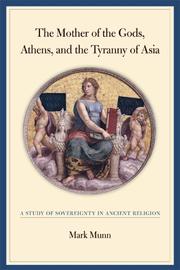| Listing 1 - 2 of 2 |
Sort by
|
Book
ISBN: 1282396315 9786612396311 9047441842 9789047441847 9789004132931 9004132937 Year: 2008 Publisher: Leiden New York
Abstract | Keywords | Export | Availability | Bookmark
 Loading...
Loading...Choose an application
- Reference Manager
- EndNote
- RefWorks (Direct export to RefWorks)
The traditional grand narrative correlating the decline of Graeco-Roman religion with the rise of Christianity has been under pressure for three decades. This book argues that the alternative accounts now emerging significantly underestimate the role of three major cults, of Cybele and Attis, Isis and Serapis, and Mithras. Although their differences are plain, these cults present sufficient common features to justify their being taken typologically as a group. All were selective adaptations of much older cults of the Fertile Crescent. It was their relative sophistication, their combination of the imaginative power of unfamiliar myth with distinctive ritual performance and ethical seriousness, that enabled them both to focus and to articulate a sense of the autonomy of religion from the socio-political order, a sense they shared with Early Christianity. The notion of 'mystery' was central to their ability to navigate the Weberian shift from ritualist to ethical salvation.
Cybele (Goddess) --- Serapis (Egyptian deity) --- Mithras (Zoroastrian deity) --- Mithra (Zoroastrian deity) --- Zoroastrian gods --- Mithraism --- Cult. --- Isis --- Aset --- Eset --- Iset --- İsida --- Isidi --- Izida --- Iziso --- Iside --- Izidė --- Ízisz --- Izyda --- 伊西斯 --- Yi xi si --- イシス --- Ishisu --- איזיס --- 이시스 --- Isiseu --- Исида --- Изида --- Ісіда --- إيزيس --- Īzīs --- Ἴσις --- Rome --- Religion. --- Cybele (Goddess) - Cult --- Attis (God) - Cult --- Isis (Egyptian deity) - Cult --- Serapis (Egyptian deity) - Cult --- Mithras (Zoroastrian deity) - Cult --- Rome - Religion --- Attis (God) --- Isis (Egyptian deity) --- Cybele --- Serapis

ISBN: 1282357638 9786612357633 0520931580 160129395X 9780520931589 1429402334 9781429402330 9780520243491 0520243498 9781282357631 9781601293954 Year: 2006 Publisher: Berkeley University of California Press
Abstract | Keywords | Export | Availability | Bookmark
 Loading...
Loading...Choose an application
- Reference Manager
- EndNote
- RefWorks (Direct export to RefWorks)
Among maternal deities of the Greek pantheon, the Mother of the Gods was a paradox. She is variously described as a devoted mother, a chaste wife, an impassioned lover, and a virgin daughter; she is said to be both foreign and familiar to the Greeks. In this erudite and absorbing study, Mark Munn examines how the cult of Mother of the Gods came from Phrygia and Lydia, where she was the mother of tyrants, to Athens, where she protected the laws of the Athenian democracy. Analyzing the divergence of Greek and Asiatic culture at the beginning of the classical era, Munn describes how Kybebe, the Lydian goddess who signified fertility and sovereignty, assumed a different aspect to the Greeks when Lydia became part of the Persian empire. Conflict and resolution were played out symbolically, he shows, and the goddess of Lydian tyranny was eventually accepted by the Athenians as the Mother of the Gods, and as a symbol of their own sovereignty. This book elegantly illustrates how ancient divinities were not static types, but rather expressions of cultural systems that responded to historical change. Presenting a new perspective on the context in which the Homeric and Hesiodic epics were composed, Munn traces the transformation of the Asiatic deity who was the goddess of Sacred Marriage among the Assyrians and Babylonians, equivalent to Ishtar. Among the Lydians, she was the bride to tyrants and the mother of tyrants. To the Greeks, she was Aphrodite. An original and compelling consideration of the relations between the Greeks and the dominant powers of western Asia, The Mother of the Gods, Athens, and the Tyranny of Asia is the first thorough examination of the way that religious cult practice and thought influenced political activities during and after the sixth and fifth centuries B.C.
Despotism --- Religion and politics --- Sovereignty --- State sovereignty (International relations) --- International law --- Political science --- Common heritage of mankind (International law) --- International relations --- Self-determination, National --- Politics, Practical --- Politics and religion --- Religion --- Religions --- Absolutism --- Autocracy --- Tyranny --- Authoritarianism --- Dictatorship --- Totalitarianism --- Religious aspects --- History of doctrines. --- History. --- Law and legislation --- Political aspects --- Cybele --- Cibela --- Cibele --- Cibeles --- Kybēbē --- Kibela --- Kibele --- Kubaba --- Kübelé --- Kubeleya --- Kubileya --- Kuvava --- Kybelē --- Kybelis --- Matar Kubileya --- Matar Kubeleya --- Cult --- Cybele (Goddess) --- ancient greece. --- aphrodite. --- asia. --- assyria. --- athens. --- babylon. --- chastity. --- classicism. --- classics. --- democracy. --- divinity. --- empire. --- epic poetry. --- feminine divine. --- femininity. --- gender. --- gods and goddesses. --- greek goddesses. --- greek gods. --- greek pantheon. --- hellenism. --- hesiod. --- hesiodic epics. --- homer. --- homeric epics. --- ishtar. --- lydia. --- maternal. --- maternity. --- mother of the gods. --- motherhood. --- myth. --- mythology. --- nonfiction. --- panteon. --- persian empire. --- philosophy. --- phrygia. --- politics. --- purity. --- religion. --- religious cults. --- sacred marriage. --- sexuality. --- tyranny. --- tyrants. --- war. --- western asia.
| Listing 1 - 2 of 2 |
Sort by
|

 Search
Search Feedback
Feedback About UniCat
About UniCat  Help
Help News
News